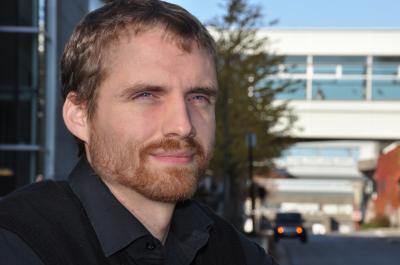Climate engineering can't erase climate change

SFU assistant professor Jonn Axsen has co-authored a new report on climate engineering to battle climate change. Credit: Carol Thorbes, SFU PAMR
After evaluating a range of possible climate-altering approaches to dissipating greenhouse gases and reducing warming, the interdisciplinary team concluded there's no way around it. We have to reduce the amount of carbon being released into the atmosphere.
“Some climate engineering strategies look very cheap on paper. But when you consider other criteria, like ecological risk, public perceptions and the abilities of governments to control the technology, some options look very bad,” says Jonn Axsen.
The assistant professor in SFU's School of Resource and Environmental Management is a co-author on this study, which appears in the latest issue of the peer-reviewed journal Frontiers in Ecology and the Environment. It is the first scholarly attempt to rank a wide range of approaches to minimizing climate change in terms of their feasibility, cost-effectiveness, risk, public acceptance, governability and ethics.
It states reducing emissions, through some combination of switching away from fossil fuels to low-carbon energy sources, improving energy efficiency, and changing human behaviour, is still the most effective way of confronting climate change.
The authors note though that some approaches to climate engineering are more promising than others, and they should be used to augment efforts to reduce the climate-change effects resulting from human activity. For example, strategies such as forest management and geological storage of carbon dioxide may be useful complements.
Other climate engineering strategies are less appealing, such as fertilizing the ocean with iron to absorb carbon dioxide or reducing global warming by injecting particles into the atmosphere to block sunlight.
“Take the example of solar radiation management, which is the idea of putting aerosols into the stratosphere, kind of like what happens when a large volcano erupts,” Axsen explains.
“This is a surprisingly cheap way to reduce global temperatures, and we have the technology to do it. But our study asked other important questions. What are the environmental risks? Will global citizens accept this? What country would manage this? Is that fair? Suddenly, this strategy does not look so attractive.”
Working under the auspices of the National Science Foundation, the authors spent two years evaluating more than 100 studies that addressed the various implications of climate engineering and their anticipated effects on greenhouse gases.
The authors hope their study will help the public and decision-makers invest in the approaches with the largest payoffs and the fewest disadvantages. At stake, they emphasize, are the futures of our food production, climate and water security.
Background: Axsen's collaborators were Daniela Cusack, an assistant professor of geography in the University of California, Los Angeles' College of Letters and Science; Lauren Hartzell-Nichols, acting assistant professor in The Program on Values in Society and The Program on Environment at the University of Washington; Katherine Mackey, a postdoctoral researcher at Woods Hole Oceanographic Institution and the Marine Biological Laboratory; Rachael Shwom, assistant professor in human ecology at Rutgers University; and Sam White, assistant professor of environmental history at Ohio State University.
Simon Fraser University is consistently ranked among Canada's top comprehensive universities and is one of the top 50 universities in the world under 50 years old. With campuses in Vancouver, Burnaby and Surrey, B.C., SFU engages actively with the community in its research and teaching, delivers almost 150 programs to more than 30,000 students, and has more than 125,000 alumni in 130 countries.
Simon Fraser University: Engaging Students. Engaging Research. Engaging Communities.
Contact: Jonn Axsen, 778.782.9365, 778.239.1169, jaxsen@sfu.ca
Carol Thorbes, PAMR, 778.782.3035, cthorbes@sfu.ca
Note: Axsen will be available to do media interviews starting at 11 a.m., Tuesday, June 2.
Media Contact
All latest news from the category: Interdisciplinary Research
News and developments from the field of interdisciplinary research.
Among other topics, you can find stimulating reports and articles related to microsystems, emotions research, futures research and stratospheric research.
Newest articles

NASA: Mystery of life’s handedness deepens
The mystery of why life uses molecules with specific orientations has deepened with a NASA-funded discovery that RNA — a key molecule thought to have potentially held the instructions for…

What are the effects of historic lithium mining on water quality?
Study reveals low levels of common contaminants but high levels of other elements in waters associated with an abandoned lithium mine. Lithium ore and mining waste from a historic lithium…

Quantum-inspired design boosts efficiency of heat-to-electricity conversion
Rice engineers take unconventional route to improving thermophotovoltaic systems. Researchers at Rice University have found a new way to improve a key element of thermophotovoltaic (TPV) systems, which convert heat…



